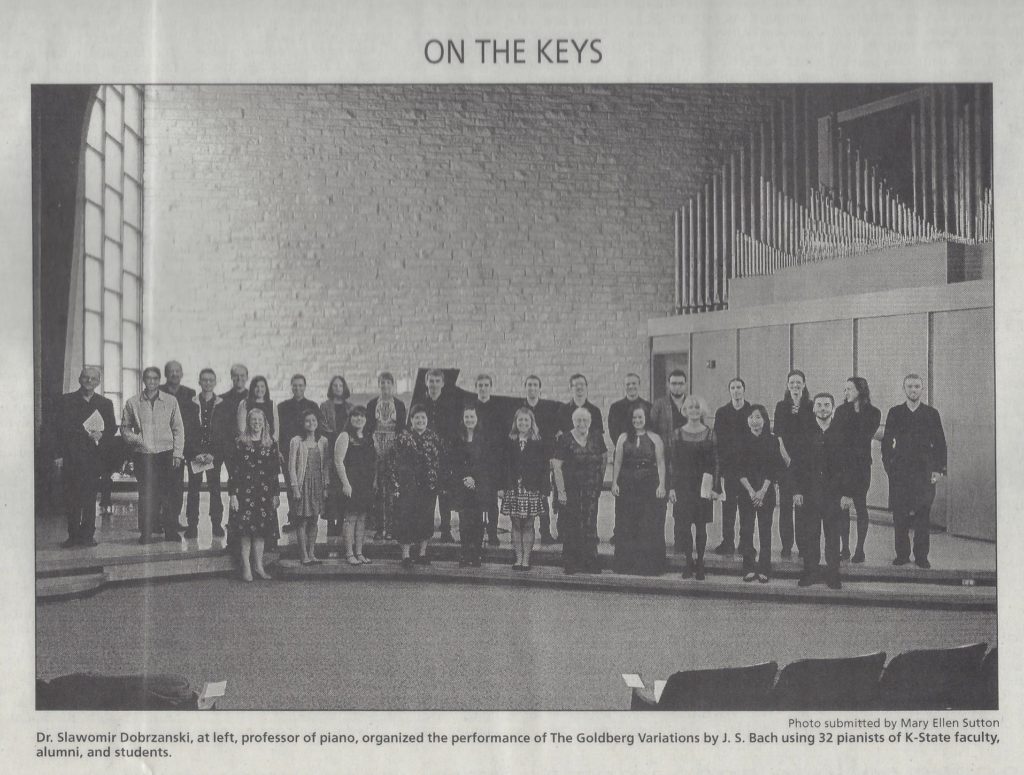Around the middle of February, I decided to join 31 other Kansas State University piano faculty, students, alumni and guests, preparing a performance of J. S. Bach’s Goldberg Variations, to take place April 2.
The entire work, 50 pages of “technical virtuosity, compositional ingenuity, and transcendent musical expression” (according to Dr. Virginia Houser’s program notes) also takes between 75 and 90 minutes to perform, depending on one’s tempo, and is therefore not something that the mortal among us endeavor to tackle in its entirety by oneself.
Since I came in as the preparation was already well underway, I had no choice in which variation I would perform; it so happened that the person who had signed up for the reprise of the aria at the very end was unable to perform, so that’s what I got.
I had heard the piece but had never taken the time to learn it. It was surprising, and a bit depressing, how long it took me to just learn the notes. There is some polyphony, some tricky rhythms, a bit of ornamentation, and then there was, for me, the challenge of trying to figure out what to do with such deceptive simplicity. I listened to a few YouTube recordings but didn’t really like any: most of them were either sentimentally swooney, or strict and unfeeling. Glenn Gould was extreme but actually came close to what I thought it should sound like.
I practiced, and played, practiced, played, over and over, trying different things, and finally realized that I had no real concept of the piece. No plan, no image, no anything. It was such a perfect example of hitting all the right notes and still not making music – at least not the kind of music this utterly sublime Aria deserved.
With some panic, and hesitation – I should be able to figure this out on my own, shouldn’t I?! -, five days before the performance I emailed my professor from grad school, Bob Edwards, asking if he would be willing to listen to me. He was, and did, and mostly encouraged me to use a bolder tone, carrying the sound to the last row, and to linger a bit more, here and there, employing a very careful rubato. He used words like “delicious”, and “scrumptious” to describe the tone and sound to aim for. And always, sing! Sing! It opened my ears, and I liked the new sound.
When I told Mark, who had patiently listened to my practicing over the last couple weeks, that I had found a new tone, but that – three days before the performance – I still wasn’t entirely sure of everything, he asked how this Aria fits with the piece that comes before it – the Aria should be a somewhat logical continuation, or perhaps contrast. Without thinking too deeply about it, I said that this Aria, unlike the first one which – note-wise – is identical, should sound retrospective, perhaps like an old person looking back over their life, remembering the good, and the not so good.
Suddenly I saw my mother who a bit more than seven years ago had just been informed by the hospital physician that the mysterious neurological symptoms that had plagued her for a good ten, twenty years, gradually worsening, were in fact ALS. No cure, no prospect of ever getting better again, or even going back home, only gradually losing more and more of her ability to move, swallow, speak, eventually breathe. She already was unable to use her legs anymore, and because of severe osteoporosis wasn’t able to sit up, comfortably.
My mother used to love to travel – she was in Turkey when she became too sick to stay and had to be flown to Germany -, and she delighted in good food, whether prepared at home or dining out. I remember her phone call from Turkey, “You should taste the food here! The carrots! I’ve never had carrots that tasted so fresh!” Now she would never be able to travel again, and eating had become a chore already.
While she had a preference for sentimental books and movies, when it concerned her life, herself, she was refreshingly unsentimental. She had short bouts of honest sadness and despair, allowing – once – that her diagnosis was “crushing”. But she also, in one of the many introspective moments she shared with me, said, in a voice as if it had just occurred to her, “You know … we really did have a good life.”
The next time I sat down to play the Aria, I saw my mother, looking back over her life, remembering, reminiscing, somewhat removed already but still very much here. When I ended I was in tears.
I was afraid that performing the Aria which had now become so very personal, private in a way, would get to me emotionally and I’d end up in tears on stage. But as I kept playing and practicing over the next two days, playing mostly, practicing to perform, my mother who had been so very present started to fade into the background. The memory of her was still there, and I will probably never hear or play the Aria again without thinking of her, but I was able to play without tearing up.
Receiving a short email from Bob Edwards after the performance, saying he thought I played the Aria beautifully – that was emotional. As was having several of my students come up to me after the performance – one even brought flowers. And Mark. Many many hugs, and Thank You’s, and smiles, and relieved laughter.
Video on YouTube: https://youtu.be/mLmjuPOoTeE
Johann Sebastian Bach. After almost three hundred years, he still gets to people.
Thank God.

